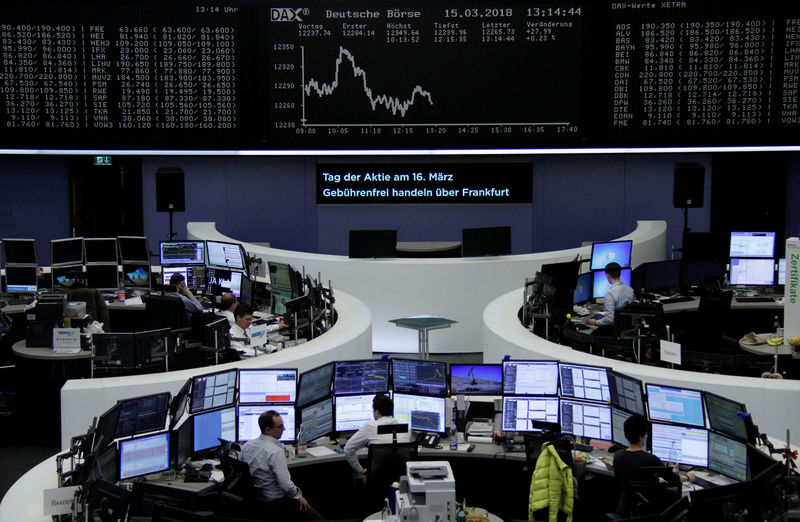Investing.com’s stocks of the week
By Marc Jones
LONDON (Reuters) - A brief break in global trade squalls helped to nudge stocks and the dollar higher on Thursday, though the risk they could return at any time also meant investors were sticking close to ultra-safe government bonds.
Upbeat results from insurance heavyweights Munich Re (DE:MUVGn), Generali (MI:GASI) and Old Mutual
Wall Street was pointing modestly higher as well after a bumpy session on Wednesday and the dollar managed a small bounce after three days of losses, though not against the safe-haven yen.
"The big questions the market has are about politics in the United States at the moment and about trade policy," said Julien-Pierre Nouen, Chief Economic Strategist at Lazard Frères Gestion.
"Exporters have been a bit weak and you can see there are some worries about whether other countries will retaliate ... but you really have to stick to the economic outlook and, in fact, we think the economic outlook remains very good."
The trade tensions hadn't gone off the boil completely.
China's widely read state-run tabloid the Global Times said the United States was trying to play the victim with its claims of trade imbalances while Europe's export powerhouse Germany warned that a trade war could "cause tangible damage".
The big bond market safety plays -- U.S. Treasuries and German Bunds -- steadied after a brief early European sell-off. If they manage a fourth day of gains it will be the longest winning streak since November.
Larry Kudlow, incoming director of the White House national economic council, had said on Wednesday that China had earned a tough response on trade, even though he has previously criticized "blanket" tariffs.
He also said he would like to see the dollar a "wee bit stronger than it is currently".
In an ominous sign for Trump's Republicans eight months before national mid-term elections, a moderate Democrat candidate looked to have won what should have been a shoo-in congressional election for Republicans in Pennsylvania.
The dollar index (DXY), which measures the grrenback against a basket of six other major currencies, was up 0.2 percent at 89.698 ahead of U.S. trading and at $1.2345 against the euro (EUR=), having fallen almost 1.5 percent this month.
Just before the U.S. opened, data showed another fall in the number of Americans filing for unemployment benefits.
For inflation watchers such as the Federal Reserve, U.S. import prices also rose more than expected in February.
JAPAN HOLDING UP
Asian trading had been mixed.
Shanghai lost 0.3 percent (SSEC) whereas Hong Kong's Hang Seng (HSI) ended flat and Japan's Nikkei (N225) erased early losses to finish just about up despite a stronger yen and an ongoing scandal surrounding Prime Minister Shinzo Abe and Finance Minister Taro Aso.
Abe has denied wrongdoing by himself or his wife, and Aso has denied instructing any cover-up in a row over the discounted sale of state-owned land to a school operator.
Japan's equity market "has been holding up relatively well" but will have to decline if U.S. shares deepen their losses, said Yutaka Miura, senior technical analyst at Mizuho Securities in Tokyo.
There was brighter news elsewhere in the region as China's President Xi Jinping offered encouragement for South Korea's initiative to nurture peaceful engagement with North Korea, and Russia also expressed support.
North Korean Foreign Minister Ri Yong Ho has also begun a rare two-day visit to Sweden, which represents the United States diplomatically in the isolated country, the Swedish Foreign Ministry said on Thursday.
The Norwegian crown rose to its highest in four months after the country's central bank signaled that its first rate rise in seven years will come earlier than previously expected.
Sterling, though, was back below $1.40 as Britain and Russia continued to trade barbs a day after the UK said it would expel 23 Russian diplomats over the poisoning of a former Russian spy living in Britain.
Russian Foreign Minister Sergei Lavrov accused London of behaving in a "boorish" way with the expulsions and that Moscow's response would come "very soon".
There was also more Brexit stress for the pound. France's markets watchdog said the European Union's system for granting financial market access would have to be toughened up after Brexit.
Britain's third-biggest company Unilever (LON:ULVR), meanwhile, said it was scrapping its London corporate headquarters.
In metals markets, safe-haven gold lost some of its appeal, with spot prices dipping 0.1 percent to $1,326.16 an ounce
Oil prices held steady, though, with Brent crude futures (LCOc1) at $64.91 a barrel and U.S. West Texas Intermediate (WTI) crude futures (CLc1) fractionally higher at $61.05.
The market is being supported by healthy global demand, but that is being offset by a relentless rise in U.S. production that is undermining OPEC-led efforts to cut supplies and prop up prices.
